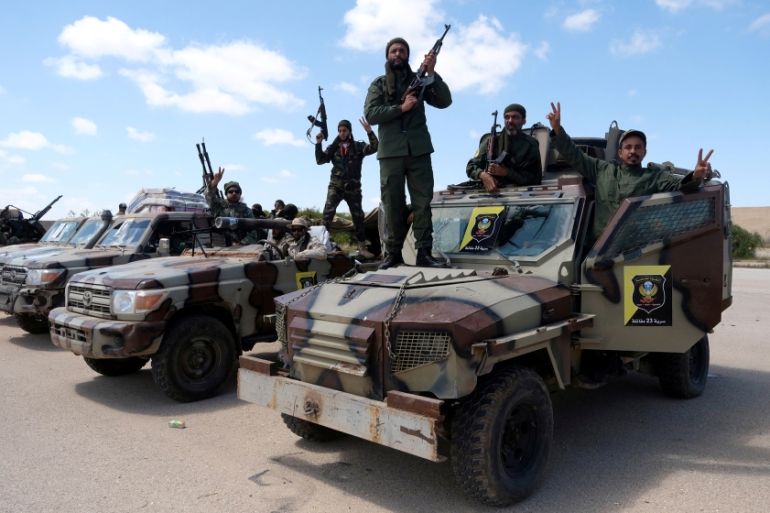Libya: Haftar’s LNA says blockade on oil will continue
LNA spokesman says oilfields and ports ‘closed until the orders of the Libyan people are implemented’.

Renegade military commander Khalifa Haftar’s self-styled Libyan National Army (LNA) has said it would maintain a blockade on oil production and exports that the National Oil Corp (NOC) says has cost the country $6.5bn in lost revenue.
Friday’s loading of a first tanker since January with oil from storage had led NOC to lift force majeure on all exports, though it warned that damage to fields meant it would take a long time to fully restore production.
Keep reading
list of 4 itemsChina’s economy beats expectations, growing 5.3 percent in first quarter
Inside the pressures facing Quebec’s billion-dollar maple syrup industry
Manipur’s BJP CM inflamed conflict: Assam Rifles report on India violence
However, LNA spokesman Ahmed Mismari on Saturday said in an online statement the country’s oilfields and ports are “closed until the orders of the Libyan people are implemented”, laying out conditions to lift the blockade.
Mismari demanded that oil revenue should flow into a new bank account outside Libya to be distributed between regions; that it should not fund what he called “terrorists and mercenaries”; and an audit of central bank accounts to investigate past spending.
Libya has been split since 2014 between the Turkey-backed Government of National Accord (GNA) in Tripoli, which is recognised by the United Nations, and the LNA in the east, supported by the United Arab Emirates, Russia and Egypt.
|
|
Under existing arrangements backed by the UN, oil is produced and exported by the NOC with revenues flowing to the Central Bank of Libya.
Both institutions are based in Tripoli, but the money funds public sector bodies and the salaries of state employees in all parts of the country across front lines.
The oil production has almost come to a standstill in Libya after pro-Haftar groups shut down oil facilities in eastern parts of the country in January.
Libya has the largest oil reserve in Africa and can produce 1.2 million barrels of crude oil a day.
But the production has fallen below 100,000 barrels a day due to the interruptions by the pro-Haftar groups over the past six months.
The LNA routinely describes pro-GNA forces as “terrorists” and Turkish forces that back the Tripoli government as mercenaries.
The UN has decried a flood of foreign fighters and weapons into Libya to support both sides of the war in violation of an arms embargo.
The two sides are poised to square off near Sirte, where some of its largest fields and export terminals are located.